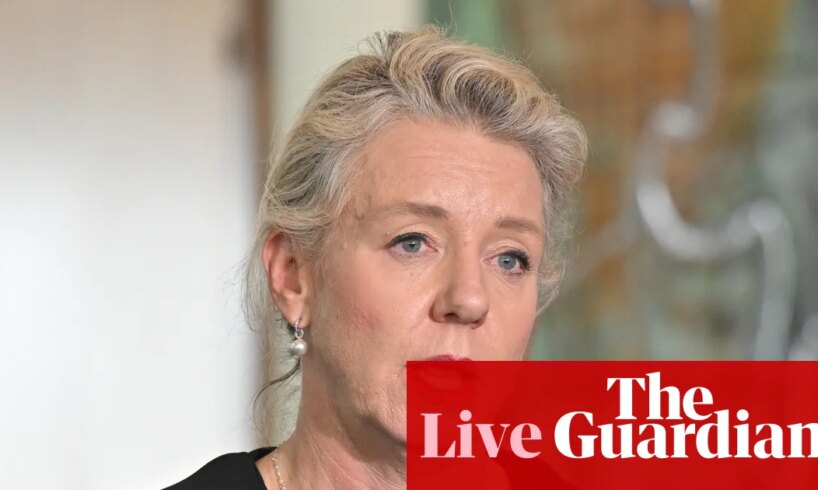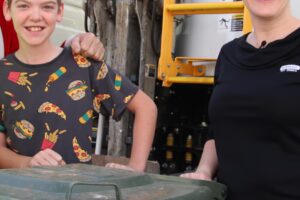
Ditching net zero emissions target in the ‘national interest’, Bridget McKenzie says
The Nationals’ Senate leader, Bridget McKenzie, says her party’s decision to ditch net zero emissions by 2050 targets over the weekend was in the “national interest” and nothing to do with the Liberal party’s policy position.
Appearing on ABC’s Afternoon Briefing, McKenzie was asked whether the Nationals’ policy was about pushing the Liberals to dump net zero. She replied: “Not at all.”
Action on climate change is an absolute non-negotiable, but the reality is how we are pursuing lowering emissions in this country is failing.
Pressed on whether it would be possible to stay in the Coalition if the Liberal party backed net zero targets, McKenzie said they would have to “go through their own processes”.
We have been pretty upfront … about having this conversation within our party room and putting our people, our industries and their future at the very forefront of our decision-making. So we have taken this decision in the national interest, we believe it is the best pathway to have a better, cheaper and more fair energy policy …
I don’t think it helps the Liberal party or the Coalition more broadly for me to be commentating on what they may or may not do.
Share
Updated at 06.23 CET
Key events
Show key events only
Please turn on JavaScript to use this feature
Anne Davies
Where to now for workers compensation reforms in NSW?
Continued from previous post:
If the findings of the latest parliamentary report into the proposed scheme, released Monday afternoon, is any guide, it’s clear Labor faces an uphill path to passing the bill in the upper house.
It must win over six independents and minor party MLCs but the strength of the criticism in the report, and the accumulated evidence from victims, experts and medical professions will weigh heavily against Labor being able to win sufficient votes.
Despite pressure from the business lobby over possible increases in premiums it is clear that the opposition is not for turning.
Instead the Greens and the opposition have used the report to pointedly direct the government to go back and do their homework:
There are a host of other levers the government could pull to reform practices within the scheme and place it on a stronger financial footing – instead, the Government has chosen to address the issue of financial sustainability by taking the inconceivably lazy and unfathomably cruel measures outlined in this piece of legislation, including cutting off compensation payments for psychologically injured workers with a degree of permanent impairment between 21% to 30%.
The workers compensation system must continue to support the people who need it most. Assessment processes and criteria must enable that as best as possible.”
Leaving injured workers with serious mental health conditions without access to required supports (as well as without ongoing income support) and a sense of abandonment and injustice carries a significant risk that some injured workers may engage in self-harm and death by suicide.
The opposition has said it will support amendments proposed by independent Mark Latham that tighten definitions of sexual harassment and bullying, so that fewer people will access the scheme.
One finding says the key to cost reductions is “to substantially reduce the number of claims at the entry points to the schemes”.
Damien Tudehope said the key to curtailing costs of the workers compensation scheme was to improve the return to work rates.
The report recommended: “Further improvement is needed to address ongoing issues with claims management processes and return to work rates.”
It warned that delays in injured workers getting needed treatment (which can result in psychological injuries worsening, sometimes to a degree that makes full recovery much more difficult and even unlikely to ever be achieved), and poor return to work rates were driving up costs.
Share
Updated at 07.06 CET
Anne Davies
The Greens, Coalition and independent Mark Latham have branded the NSW government’ changes to workers compensation “dramatic, harsh and dangerous” in a seering parliamentary report, tabled on Monday.
The changes are designed to curtail access to longer-term essential medical supports and wage replacement payments, for people who experience a work-related psychological injury.
Chairperson, Greens MLC Abigail Boyd wrote:
Their implications are dramatic, harsh and dangerous. This legislation is discriminatory, and perpetuates stigma related to psychological illness by treating psychological injuries as illegitimate and those who suffer them as being not as debilitated as someone with a physical injury. It is further discriminatory through its gendered impacts which would have a radical and disproportionate impact on working women in NSW.
Psychological injury claims have risen steeply in the NSW public sector, particularly among teachers and nurses.
The majority report, made up of the minor parties and Coalition members has rejectrd outright the government’s attempts to lift the threshhold for whole of person impairment to 31%, saying this is far too high.
Shadow treasurer, Damien Tudehope said if the treasurer, Daniel Mookhey had told his colleagues that this was in line with South Australia’s rules, he had misled them, because the scales used in the two states were not comparable.
Instead it has suggested a number of other measures to fix the scheme, including changes to definitions, better claims management and steps to get injured workers back to work.
The report was also scathing of Mookhey’s treatment of a Icare whistleblower who he had relied on when in opposition. The whistleblower, Chris McCann said in evidence that when he contacted Mookhey to warn of what the changes would mean, he had been ignored before being told he should contact Lifeline.
Finding 2 said:
Members of Parliament have a special responsibility to look after whistleblowers, given the risks they take and the vulnerabilities they experience. The Treasurer failed to do this by betraying Mr Chris McCann both in personal and policy terms.
The Labor members issued a separate dissenting report.
Share
‘Printing issue’ to blame for error on Victorian year 12 Persian exam
The Victorian Curriculum and Assessment Authority (VCAA) says no students will be disadvantaged after a printing error was picked up in a question on this year’s VCE Persian examination.
A spokesperson for VCAA said it was aware of a “printing issue” that had affected one question in the examination, which about 100 students sat last month.
According to the VCAA, the Persian language font included in the question was incorrectly embedded into the printer, which scrambled the characters in the printed question.
The spokesperson said:
Once alerted, students were told to disregard the Persian language translation and to read the English prompt to that question, which was printed correctly. No student will be disadvantaged due to this printing issue.
The VCE has been marred by controversy in recent years, with dozens of questions on papers inadvertently published last year and a number of errors uncovered in 2023 and 2024 maths exams.
In April, the entire board of Victoria’s curriculum authority was sacked after a review into the state’s VCE cheat sheet bungle.
Share
Updated at 06.50 CET
Coalition can ‘close the book’ on its super for housing policy, shadow minister says
The shadow housing minister, Andrew Bragg, says the Coalition has ditched its super for housing policy for good due to the demand it would place on house prices.
Saul Eslake, the principal of Corinna Economic Advisory, found the election commitment to allow first home buyers access to their superannuation would heavily favour older and wealthier people, with the median couple aged 25 to 34 likely to be able to withdraw only $18,000.
Speaking on ABC’s Afternoon Briefing, Bragg said “we won’t have that policy again” when discussing the factors placing upwards pressure on housing prices.
It is not necessarily going to solve the problem and we need to have more effort on the supply side. There may still be a case for some demand-side measures but I want to reorient our overall position.
I’m worried that the Liberal Party in some quarters is being seen as a party of nimbies and I want to ensure that we are a party of development.
I think it or the way that it was designed, I think we can pretty much close the book on that one … I’m not sure that necessarily we should be leading with a demand-side policy.
Andrew Bragg. Photograph: Mick Tsikas/AAPShare
Updated at 06.49 CET
Patrick Commins
Home building approvals on the rise but still well below Labor’s target
There were 191,695 home building approvals in the year to September, the most in nearly three years but still well short of the annual rate required to meet Labor’s target of 1.2m new homes built by the end of the decade.
To meet that “ambitious” goal – included in the Albanese government’s housing accord – we would need to build 240,000 homes on average annually over the five years to mid-2029.
Nobody believes that target will be met, which bodes badly for our ability to build our way out of the housing affordability crisis.
Indeed, separate ABS data has shown there were nearly 174,300 new homes actually built (not just approved) in 2024-25, or the first full year of the housing accord.
Good, but not good enough
All of which detracts from the good news story that the number of homes being approved to be built has been heading higher.
The number of home building approvals in the year to September was 14% higher than in the year to September 2024, according to Master Builders Australia.
Getting anywhere near Labor’s target requires a massive pickup in building of higher density projects.
The total monthly number of homes approved which were apartment or townhouse builds (so not standalone houses) jumped to 18,145 in September. The last time monthly no-house approvals approached that level was in August 2022.
Share
Updated at 06.32 CET
Australia is ‘best served by a strong Coalition government’, Bridget McKenzie says
Earlier this year, the Liberals and Nationals temporarily split in the wake of the federal election result, with their breakup lasting less than a month.
Asked if they could cut ties again, McKenzie said Australia was “best served by a strong Coalition government”.
We have seen that for the entirety that Liberal Party has been in existence …
We have been unequivocal in having a strong foundation to make this decision [on net zero], we have not taken it lightly. We believe we can do this a better way, low emissions without trashing our economy and environment. That’s a responsible decision to make.
We made a considered decision, we are not getting out of the Paris Agreement. We are getting out of net zero by 2050 because it is not in our national interest.
Bridget McKenzie. Photograph: Mick Tsikas/AAPShare
Updated at 06.23 CET
Ditching net zero emissions target in the ‘national interest’, Bridget McKenzie says
The Nationals’ Senate leader, Bridget McKenzie, says her party’s decision to ditch net zero emissions by 2050 targets over the weekend was in the “national interest” and nothing to do with the Liberal party’s policy position.
Appearing on ABC’s Afternoon Briefing, McKenzie was asked whether the Nationals’ policy was about pushing the Liberals to dump net zero. She replied: “Not at all.”
Action on climate change is an absolute non-negotiable, but the reality is how we are pursuing lowering emissions in this country is failing.
Pressed on whether it would be possible to stay in the Coalition if the Liberal party backed net zero targets, McKenzie said they would have to “go through their own processes”.
We have been pretty upfront … about having this conversation within our party room and putting our people, our industries and their future at the very forefront of our decision-making. So we have taken this decision in the national interest, we believe it is the best pathway to have a better, cheaper and more fair energy policy …
I don’t think it helps the Liberal party or the Coalition more broadly for me to be commentating on what they may or may not do.
Share
Updated at 06.23 CET
Sydney man in critical condition after dog attack
A 55-year-old man is in a critical condition after being attacked by a dog in Sydney’s inner west this morning.
NSW police said about 10am today, emergency services were called to a unit in Camperdown after reports of the attack. The man was located inside the property with serious injuries, police said.
He was treated at the scene by paramedics for arm and leg injuries before being taken to Royal Prince Alfred hospital in a critical condition, a spokesperson for NSW Ambulance said.
Three dogs have been seized from the property by Sydney city council, police said. Inquiries into the incident are continuing.
Share
Updated at 06.08 CET
Polling analyst warns Liberals axing net zero pledge would put ‘more nails in party’s coffin’
The Coalition is unlikely to be in power for another decade if the Liberals follow the Nationals in jettisoning their commitment to net zero emissions by 2050, an expert warns.
The Nationals voted unanimously over the weekend to drop the target from the party’s official platform, setting up a potential clash with the Liberals.
Moderate Liberal MPs have advocated for the party to maintain its support for the target, while conservatives have urged Sussan Ley to abandon the pledge.
Kos Samaras, founder of research firm Redbridge, said the Coalition risked losing much-needed votes from younger Australians after its election drubbing in May if it dropped the climate commitment.
He told AAP:
Politically, at this rate, they won’t be in government in the next 10 years. The Coalition is only securing 15% to 16% of gen Z voters in this country. This entire saga is going to continue to basically put more nails on that coffin of theirs when it comes to talking to younger Australians.
– AAP
David Littleproud and Sussan Ley in question time. Photograph: Lukas Coch/AAPShare
Updated at 06.02 CET
Krishani Dhanji
Thank you all for following along on the blog with me today.
I’ll hand you over to the wonderful Caitlin Cassidy, and see you here bright and early tomorrow!
ShareDan Jervis-Bardy
Investor group urges Coalition to continue support for net zero emissions by 2050
Investors are urging the Coalition not to abandon net zero emissions by 2050, as bipartisan political support for the emissions target hangs in the balance.
In a statement on Monday after reports the Liberals could follow the Nationals in abandoning net zero emissions, the Investor Group on Climate Change (IGCC) emphasised the need for “broad political support” for the target.
The IGCC executive director, Francesa Muskovic, said:
Investors want to see broad political support for net zero by 2050, as well as the much stronger policies that are needed to accelerate the country’s rollout of renewable energy and clean industry.
Until we reach net zero, floods, fires and droughts will become worse, productivity, food supply and community health will go down, and Australians will experience those losses in their superannuation balances and across their financial lives.
Share
Updated at 05.46 CET
TLDR: Here’s what happened in question time
It was a largely subdued affairs in the house during question time today, other than a couple of blow-ups that led to the eviction of Ted O’Brien early on in the piece.
The Coalition did a bit of a repeat of questions from last week to this week (perhaps because Anthony Albanese was back from overseas) including pushing the PM on last week’s inflation rate.
From the crossbench, independent Zali Steggall asked about local content quotas for streaming services (there wasn’t much of an update of any progress on Labor’s election promise) and Andrew Wilkie pushed Chris Bowen on Australia’s scope three emissions – which include carbon emissions in exported coal and gas.
New Zealand’s speaker was in the chamber today – the first time a visiting speaker has sat on the floor of the house for question time in 21 years.
Share
Updated at 05.38 CET
Josh Butler
Senate question time descends into ‘rabble’
The Senate chamber is descending into some uproar now. The government’s Senate leader, Penny Wong, criticised David Pocock, claiming he should sit in the Liberal party room because they had teamed up on the previous motion.
Greens senator Sarah Hanson-Young says the Greens won’t support the Coalition motion on locking the government out of questions, but says QT has become a “farce” and is criticising both Labor and Coalition over the situation. Senators from both major parties are also yelling back at her.
Hanson-Young asks the Senate president, Sue Lines, to control the “rabble” that the chamber is turning into.
Pocock is now speaking, saying he won’t support the Coalition motion either, but continues criticising the government for not releasing the report into board appointments.
We’re still technically in question time here, and I think we’ll still get the extra five questions that last week’s motion originally mandated. But there’s a bit happening in the chamber at the moment.
“I applaud the Senate for actually putting our foot down and saying ‘you should comply with the order of the Senate,’” Pocock says.
Share
Updated at 05.37 CET





